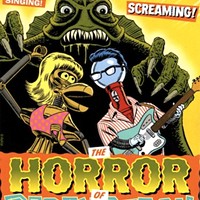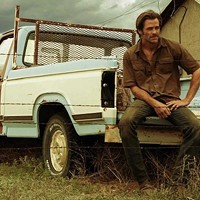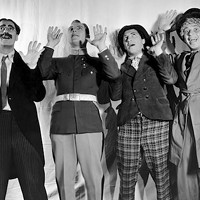(View From The Couch is a weekly column that reviews what's new on Blu-ray and DVD. Ratings are on a four-star scale.)
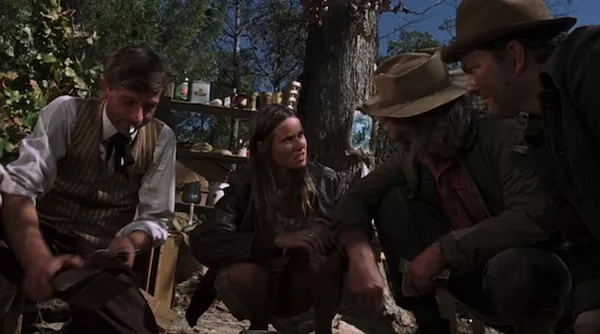
- Barry Primus and Barbara Hershey in Boxcar Bertha (Photo: Twilight Time)
BOXCAR BERTHA (1972) / RUNAWAY TRAIN (1985). The prevailing train of thought around the Twilight Time offices seems to be heavily focused on flicks featuring trains, given the company's current reissue of its Blu-ray for 1964's The Train, the upcoming December release of 1975's The Bullet Train, and the recent releases of a Martin Scorsese footnote feature and a key Jon Voight picture.
Scorsese's coming-out party was 1973's Mean Streets, but before that, he made his directorial debut with 1968's deeply personal Who's That Knocking at My Door and followed up with this obligatory Roger Corman training-ground effort. Displaying little of the bravura filmmaking style long associated with the Oscar-winning helmer, Boxcar Bertha still makes for sound cinema, with Barbara Hershey a refreshing presence as a young woman hopping the rails in Depression-era America. She spends some time with a Northern card shark (Barry Primus) even though her heart belongs to a union organizer (David Carradine), and, along with a fourth friend (Bernie Casey), they all embark on a series of robberies meant to stick it to the establishment (particularly the profitable railroad industry).

- Runaway Train (Photo: Twilight Time)
A rare quality credit for The Cannon Group, the '80s outfit responsible for a sizable number of junky action films, Runaway Train is based on an unused screenplay by Akira Kurosawa, which right there gives it no small measure of class and import. Director Andrei Konchalovsky and a trio of scripters do right by Kurosawa, delivering an exciting yarn in which two cons (Jon Voight and Eric Roberts) break out of an Alaskan prison and hop aboard a train whose engineer has just fallen off the transport, dead from a heart attack. Barreling toward oblivion, the pair must figure out how to stop the out-of-control machine, with a menial train employee (Rebecca DeMornay) as the only other passenger. Roberts is overly mannered yet still effective, but it's Voight who's the powerhouse here, delivering one of his best performances as a hardened killer who's equal parts man and beast. Voight, Roberts and editor Henry Richardson all earned Academy Award nominations.
Blu-ray extras on Boxcar Bertha consist of the theatrical trailer and an isolated score track. Blu-ray extras on Runaway Train consist of audio commentary by Roberts and film historians David Del Valle and C. Courtney Joyner; the theatrical trailer; and an isolated track of Trevor Jones' score.
Both Movies: ***
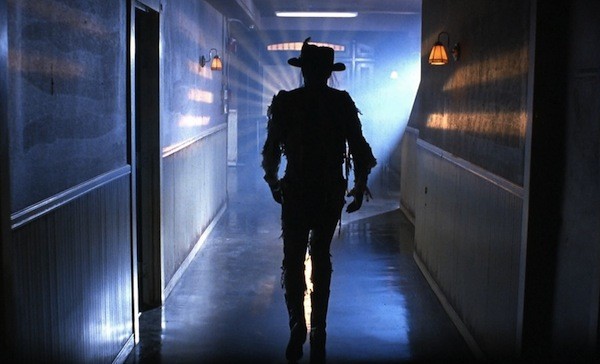
- Bubba Ho-Tep (Photo: Shout! Factory)
BUBBA HO-TEP (2003). A mere plot synopsis in tandem with that moniker is all that's required to show that writer-director Don Coscarelli (Phantasm) was shooting for instant cult status with Bubba Ho-Tep: Tucked away anonymously in a nursing home, an aging guy claiming to be Elvis Presley (Bruce Campbell) partners with an elderly man claiming to be John F. Kennedy (Ossie Davis!) to take down a resurrected mummy who stomps around sporting a cowboy hat. The premise is loopy enough to offer some diversion, and Campbell is delightful in one of his best roles as a crotchety Elvis whose quickness with the quips masks his concerns about his advancing age (Davis is fun as well in his supporting stint). But hampered by either its low budget or a reluctance to go for broke (something a true cult film would never do), Bubba Ho-Tep never quite lives up to its whacked-out potential, though there's just enough of merit to recommend it to anyone seeking something a step or two off the beaten path. Besides, you gotta dig an end-credits sequence that promises a sequel called Bubba Nosferatu (even if it has yet to materialize).
Blu-ray extras include audio commentary by Coscarelli and Campbell; separate audio commentary by Joe R. Lansdale (author of the source material); separate audio commentary by Campbell in character as The King; a making-of featurette; deleted scenes; interviews with Coscarelli, Campbell and special effects artist Robert Kurtzman; pieces on the makeup design, the costumes, and the music; and the theatrical trailer.
Movie: **1/2

- David Oyelowo and Dianne Wiest in Five Nights in Maine (Photo: FilmRise)
FIVE NIGHTS IN MAINE (2016). Maris Curran, the writer-director of Five Nights in Maine, has stated the importance of finding more roles for black actors as well as for actresses over a certain age. It's a great sentiment, and Curran has certainly backed up her position by making a film starring black actor David Oyelowo and 68-year-old actress Dianne Wiest. It's just a shame the movie isn't better. Oyelowo, cheated out of an Oscar nomination for playing MLK in Selma, stars as Sherwin, whose wife Fiona (Hani Furstenberg) dies in a car accident shortly after the film commences. Even Sherwin's sister Penelope (Chi-raq star Teyonah Parris) can't stir him out of his stupor, a deep-seated depression that results in him merely laying around his Atlanta home, drinking plenty of whiskey. Sherwin finally elects to travel to Maine to visit Fiona's mom Lucinda (Wiest), a woman who never approved of her daughter's marriage. The tension between Sherwin and Lucinda is palpable, with the latter's friendly nurse (Rosie Perez) only offering an occasional reprieve from all the iciness on view. Five Nights in Maine feels less like a complete motion picture than an unfinished skit for an acting workshop — while the performances are fine, the characterizations are too vague to be involving, with Wiest's mad matriarch particularly sketchy. Additionally, the decision to shoot practically the entire movie in extreme close-up was only a little less misguided than the decision to shoot with a handheld camera that never stays steady.
Blu-ray extras include interviews with Curran, Oyelowo and Perez.
Movie: *1/2
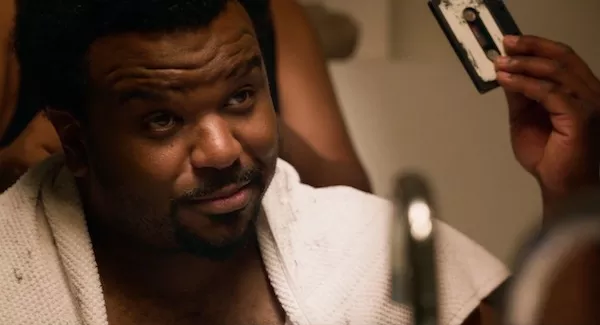
- Craig Robinson in Morris from America (Photo: Lionsgate & A24)
MORRIS FROM AMERICA (2016). Crag Robinson is best known for his comic turns in such projects as Hot Tub Time Machine, This Is the End and TV's The Office, and it was probably his willingness to stretch just a tad that earned him a special acting award at Sundance for his performance in Morris from America. Because truthfully, he's no better than anyone else in this low-key charmer — that's certainly not a knock against him but rather a roundabout way of saying that everyone here is equally memorable. Robinson adds some slivers of drama to his otherwise buoyant turn as Curtis Gentry, a widower living in Germany with his 13-year-old son Morris (Markees Christmas). If the move to foreign soil has proven to be difficult for Curtis, it's been absolutely torturous for Morris, whose outsider status and own reticence have become formidable roadblocks when it comes to social acceptance. He does befriend a 15-year-old girl named Katrin (Lina Keller), but her unorthodox behavior often confuses him — a less complicated relationship seems to be the one he shares with his tutor Inka (Carla Juri), who clearly cares for him but wonders if his proclivity for writing misogynistic rap lyrics might be cause for concern. Here's a film where the parts are better than the whole: There's nothing particularly distinguishable about Morris from America and it doesn't resonate beyond the viewing, but it does contain some lovely one-on-one scenes between Morris and Inka and especially between Morris and his supportive father.
Blu-ray extras include audio commentary by Robinson, Christmas and writer-director Chad Hartigan; a making-of featurette; a deleted scene; and bloopers.
Movie: **1/2
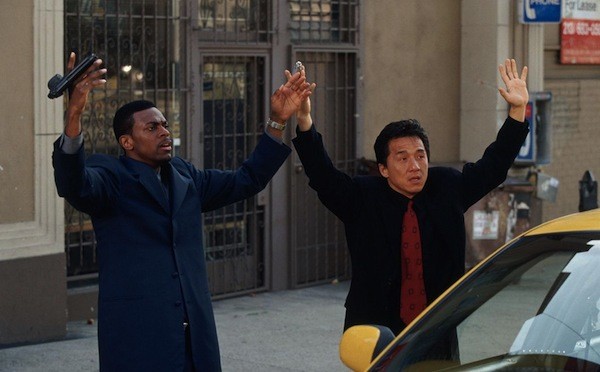
- Chris Tucker and Jackie Chan in Rush Hour (Photo: Warner)
RUSH HOUR TRILOGY (1998-2007). One of the better "buddy" flicks to appear in the waning years of the 20th century, Rush Hour (1998) also turned out to be one of the top-grossing films of its year, earning $141 million stateside (against a cost of $30 million), cementing Jackie Chan's growing popularity in this country, and launching Chris Tucker into the stratosphere of Hollywood's highest-paid A-listers (earning $3 million for this picture, he would receive $20 million for the first sequel and $25 million for the second). It's the inspired teaming of Chan and Tucker that provides most of the juice in the original, as Chan's Hong Kong detective Inspector Lee and Tucker's LA cop James Carter are forced to team up in order to rescue the kidnapped daughter (Julia Hsu) of a Chinese diplomat (Tzi Ma). Tucker's frenzy contrasts nicely with Chan's serenity, and the film nicely builds up their characters' oil-and-vinegar characters in a satisfactory manner. The sloppy Rush Hour 2 (2001) isn't nearly as patient: It immediately plops the pair right into the middle of a tired plot involving counterfeiters, and then spends an embarrassing part of the next 90 minutes ripping off scenes from the first picture. With the freshness of the high-concept hook exhausted, little remains except some tired comic routines, OK action sequences, and a distasteful prejudice toward Asians.
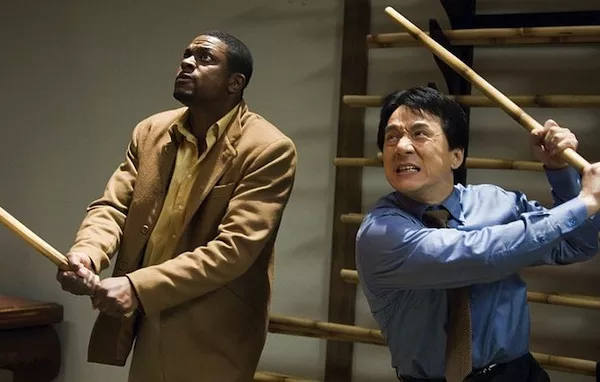
- Chris Tucker and Jackie Chan in Rush Hour 3 (Photo: Warner)
Nevertheless, even with an inflated $90 million budget, Rush Hour 2 proved to be a gargantuan hit ($226 million), which led to Rush Hour 3 (2007) being approved for a whopping $140 million. The fact that it earned exactly that break-even amount in U.S. grosses is probably why there hasn't been a Rush Hour 4 (yet), but that's a good thing since this third entry somehow manages to be even lousier than the second. The plot, involving an assassination attempt investigated by Lee and Carter, barely hangs together, but it's merely an excuse to run the two franchise stars through the paces. Chan is still fine even if he has slowed down considerably, but Tucker's initially amusing motormouth routine has further soured, and he again lets loose with a steady stream of slurs targeting women, gays, Asians, tall people, fat people, French people (rapist Roman Polanski appears as a Parisian inspector who enjoys performing rectal probes) and more. Like the rest of the film, it's not funny, just tedious beyond measure.
Blu-ray extras in the set include audio commentary by director Brett Ratner; making-of featurettes; deleted scenes; outtakes; and pieces on the visual effects.
Rush Hour: ***
Rush Hour 2: *1/2
Rush Hour 3: *
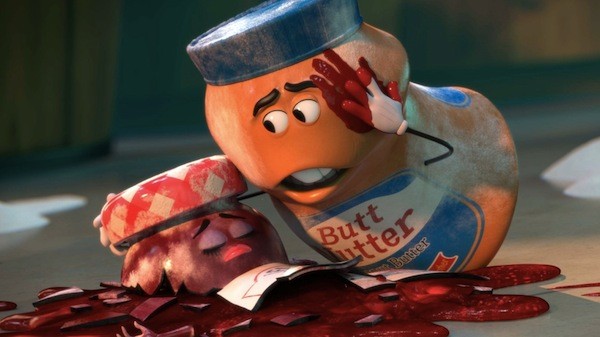
- Sausage Party (Photo: Columbia)
SAUSAGE PARTY (2016). Even the puppet-sex segment from 2004's Team America: World Police looks like an outtake from Finding Dory when compared to the extended orgy sequence in the animated Sausage Party, the latest offering from Seth Rogen, Jonah Hill and the rest of that Apatow-approved crowd. An outrageous undertaking that's only slightly more kid-friendly than Rob Zombie's House of 1000 Corpses, this toon flick for grown-ups takes place at a supermarket wherein all the products believe that, once they're purchased, a rapturous afterlife awaits them beyond those sliding doors. But it's only through the adventures of a hot dog named Frank (Rogen) and a bun named Brenda (Kristen Wiig) that the awful and inconvenient truth comes out. The laughs tumble freely (the Normandy beach scene is brilliant), yet there are also a few stretches where the humor is not only repetitive but pound into the pavement. Yet what's particularly noteworthy about the picture is not so much its crude comic content (some of it rather insipid) but the weightier thematic elements that envelop the storyline. Sausage Party is about nothing less than existential angst, spiritual fulfillment, and the search for a higher power in a potentially Godless universe — given these topics, it's no wonder that one of the characters (a bagel, no less) is made to act and sound like Woody Allen. There's also mention of the ceaseless Israeli-Palestinian conflict, a welcome pro-LGBT stance, and even a meta-moment examining the place of animated films in our entertainment cycle. That's pretty heady material for a movie in which the primary villain is a douche — and, yes, I mean that literally.
Blu-ray extras include making-of featurettes; alternative takes; and a gag reel.
Movie: ***
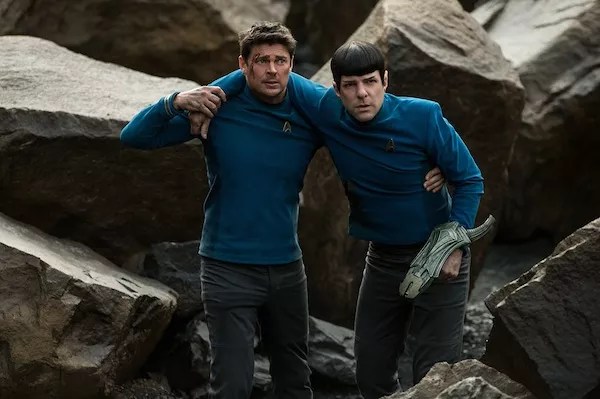
- Karl Urban and Zachary Quinto in Star Trek Beyond (Photo: Paramount)
STAR TREK BEYOND (2016). With the same level of heroism and determination exhibited by Enterprise crew members as they overcame Klingons, Romulans and William Shatner's stint in the director's chair, Star Trek Beyond finds all involved overcoming a troubled production history and shaky pre-release buzz to emerge as yet another winner in the rebooted Star Trek franchise. Despite the shake-up of key personnel, this operates in the same manner as the previous installments (2009's Star Trek and 2013's Star Trek Into Darkness) insofar as it cannily stirs memories of the original series as well as the motion picture offshoots. But even those not aware of the homages will immediately be absorbed into the story, as Kirk (Chris Pine) and Spock (Zachary Quinto) both contemplate leaving their positions aboard the Enterprise, albeit for very different reasons. Of course, such personal matters are placed on the backburner once an evildoer threatens the Federation — in this case, a snarling villain named Krall (Idris Elba). The crew members subsequently find themselves scattered across the landscape of a hostile planet, and it's at this point that the movie truly takes off, since the structure of separating the principals — Spock with McCoy (excellent Karl Urban, finally given more to do), Kirk with Chekov (Anton Yelchin, R.I.P.), Uhura (Zoe Saldana) with Sulu (John Chu), and Scotty (Pegg) with a marvelous new character named Jaylah (Sofia Boutella) — allows everyone a chance to shine. Add in a few nifty plot twists, some impressive stunt work, and a hefty amount of humanizing moments, and what's on tap is a tasty treat that deserves to succeed on Blu-ray and beyond.
Blu-ray extras include a making-of featurette; deleted scenes; pieces on the sets and visual effects; a tribute to Yelchin and Leonard Nimoy; and a gag reel.
Movie: ***1/2

